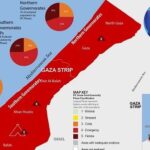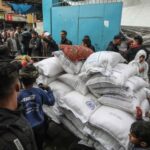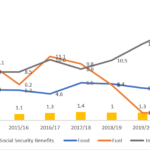The food insecurity situation in the Gaza Strip is becoming increasingly dire. A recent blog of just 10 days ago and based on an assessment by the World Food Programme pointed out that during October and November, 80 percent of the population in Gaza was displaced and more than 80 percent suffered food deficiencies
Established in 2014 and managed by the International Food Policy Research Institute (IFPRI), the Arab Food and Nutrition Security (AFNS) Blog seeks to disseminate policy-relevant discussions and insights from experts working on food and nutrition security in the MENA region.
The opinions or views contained in the AFNS Blog do not represent those of , CGIAR, , IFPRI, it's employees, agents, or affiliates.
Long-lasting Devastation to Livelihoods from Damage to Agricultural Lands in Gaza
Israel’s continuing attacks against Hamas are causing massive collateral damage to agricultural livelihoods and food supplies in the Gaza Strip. More than one third of agricultural lands in Gaza have been damaged since the outbreak of the war on October 7, 2023, according to analysis based on satellite imagery by the United Nations Satellite Centre (UNOSAT) and the UN Food and Agriculture Organization (FAO).
Famine in Gaza
Is it too late to save Gaza’s population from famine? The latest assessment of the Integrated Food Security Phase Classification (IPC) global partnership suggests this is imminent for at least half the population of 2.2 million.
Navigating Energy Subsidy Reforms in Times of Tight Budgets and High Inflation: Balancing Growth, Equity and Social Protection in Egypt
Energy costs are on the rise in Egypt and shortages of electricity have resulted in scheduled power outages since August 2023. Understanding the trade-offs inherent in the energy subsidy system can help policymakers to chart the best course in a difficult economic period.
Russia Terminates the Black Sea Grain Initiative: What’s Next for Ukraine and the world?
The deal, put in place almost a year before, was scheduled for its fourth renewal. Within hours of the announcement, Russia launched a missile attack on the port of Odesa. The following day, Russian missile attacks on key Ukraine grain handling facilities sent wheat futures prices to their largest one-day rise since February 2022. A cargo insurer operating under the agreement reportedly suspended its coverage of Ukraine Black Sea grain shipments.
- « Previous Page
- 1
- 2
- 3
- 4
- …
- 39
- Next Page »





